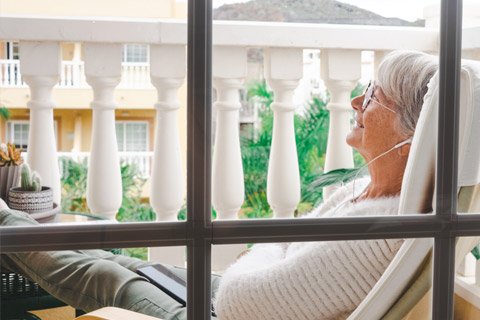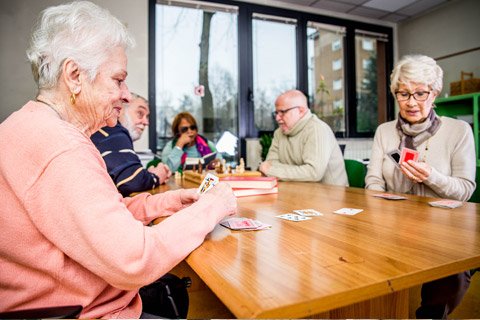There are about 90,000 people living in retirement villages in the UK. With services and support to help people enjoy later life, they are a popular choice with many people. However, with different names and descriptions of housing for older adults, it may not be clear what a retirement village is and the benefits and disadvantages of living in one.
We’ve put together a list of frequently asked questions and the pros and cons of moving into a retirement village to help you decide if it is the right choice for you.
What is a retirement village?
A retirement village is a housing development built specifically for older adults. The age range of people living in one can vary, but typically they are most popular with the over 75s. Sometimes they may be referred to as “retirement homes” or “retirement communities” because they usually have shared spaces and facilities and foster a sense of community through social events.
Often a retirement village has facilities for its residents including cafes, restaurants, social clubs, shops and communal gardens. They may even have gyms, libraries and swimming pools, as well as on-site healthcare services.
Many people use the phrase “care home” to describe all housing for old people. However, a person living in a care home normally has a bedroom within a residential home that has communal living areas.

How old do you have to be to live in a retirement village?
Most retirement villages are for people aged 65+ and the average age of people living in a retirement village in the UK is 80 years old. Normally a village would set a minimum age, although despite the name you do not need to be retired to live there.
How much does it cost to live in a retirement village in 2024?
Some people move into a retirement home to free up capital by selling and downsizing their home. Just like any other type of property, the cost can vary greatly depending on the location and size of the retirement home. The cost of London properties can be eyewatering, from £350,000 plus for a one-bed apartment, compared to between £200,000 - £300,000 for a new-build elsewhere. Many retirement properties are leasehold, meaning you own the property for a fixed-term and although this term is usually over 100 years, ownership reverts back to the freeholder unless the lease is extended.
The number of rooms, services and age of the property will affect the price. As well as the initial cost, you can expect to pay:
Service or management fee
This is an annual or monthly cost that covers the running of the village, including its upkeep and services.
Deferred management or exit fee
Some properties will come with an exit fee that is due when the property is sold. How this fee is calculated will differ depending on the retirement village provider.
Utility bills
Gas, electric and water are not normally included in the service charge or management fees and you will still need to pay these.
Council tax, insurance and living costs will not be included either. Facilities such as social clubs and healthcare services are also extra.

Are pets allowed in retirement villages?
Normally, yes, they are allowed (assuming they are well behaved and don’t have any unusual needs!). There is lots of evidence to suggest there are benefits to having pets for the elderly.
What are the advantages of living in a retirement village?
1. Social benefits and community
Lots of people choose a retirement village because of the social benefits and frequent socialising is linked to a longer lifespan and improved wellbeing. A strong sense of community and friendship can support someone with grief and loss and address social isolation in the elderly.
How to combat the effects of loneliness
Over 1.4 million older people in the UK often feel lonely according to Age UK statistics. Take a look at our tips to help combat the effects of loneliness in the elderly. Recognise the signs of loneliness by downloading our free support guide.
Social activities and events in the village can keep you active and help you enjoy company of new friends.

2. Feeling safe and secure
There is always someone nearby when you live in a retirement village and you’ll probably know your neighbours well. Some homes will have panic alarms or emergency buttons fitted as optional extras. Often there are staff on site, for example at reception or at the entrance to the village too. If you live alone or have recently lost a partner, this can be very reassuring.
3. Hassle-free, independent living
A retirement village isn’t quite an all-inclusive holiday but you normally don’t have to worry about maintenance and upkeep. Home repairs and gardening are usually included, which can be an advantage if you are finding it more difficult to maintain your home. Some retirement villages cater for their older residents with on-site nursing care, meal deliveries or easy access to health services.
4. Great facilities and services
Retirement villages often have shops and restaurants on site and hairdresser visits. There may be a swimming pool, gym equipment and fitness classes so you don’t have to travel to access these services. Social clubs, trips and transport may also be on offer.
5. Downsizing to free up capital
Moving to a smaller property can free up funds for your retirement. You may want to pay for healthcare or to simply have some fun.
What are the disadvantages of living in a retirement village?
1. Living in a retirement village may cost more than you expect
Living in a retirement village can be expensive. If you are looking to reduce your outgoings, there may be other more suitable downsizing alternatives. The fees can be confusing and you need to be aware of any costs that you might incur.
2. Community living
Whilst a retirement community is designed with older adults in mind, there are rules around things like renovations that you may not be used to. Living near many other people does not suit everyone, particularly if you like to keep yourself to yourself. You need to feel comfortable being part of the social community.
3. Adjusting to a smaller home
If you are downsizing, you will find that a retirement home in a village is smaller than a typical house. This might be an advantage to some people, whereas others will be used to more space, particularly if they have a lot of possessions.
4. Selling your retirement home
Properties in retirement villages can sometimes be more difficult to sell than regular homes. They may not hold their values as well as other properties and exit fees may apply. Restrictions on who they can be sold to, such as the minimum age of residents, can affect demand, which in turn influences the selling price.

Should I consider a retirement village?
Moving into a retirement village is a lifestyle choice as well as a financial decision. Before making a decision, it is crucial for individuals to carefully consider their personal needs and financial situation. You should visit several retirement villages because they will look and feel different and it will help you understand the lifestyle and amenities offered. This can help ensure that your choice aligns well with your preferences and requirements for this stage in your life.
Remain independent at home
View our full range of fall alarms and emergency buttons to find the best personal alarm for your circumstances.


